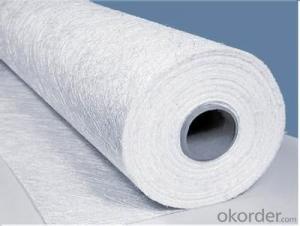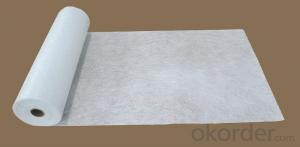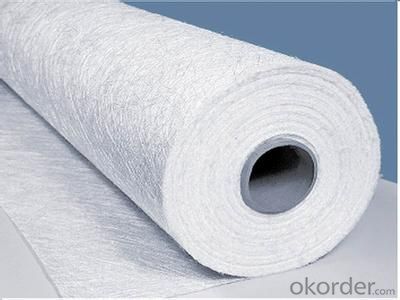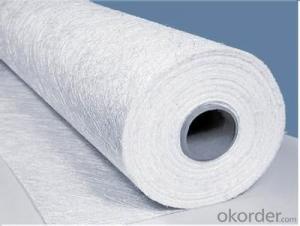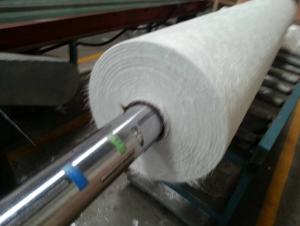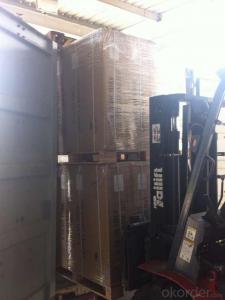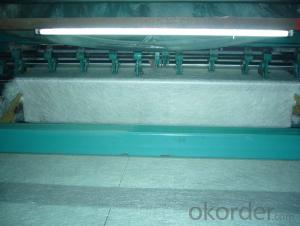Fiberglass Mat Tissue E Glass Fiber Chopped Strand Mat for Hand Layup
- Loading Port:
- Shanghai
- Payment Terms:
- TT OR LC
- Min Order Qty:
- 20000 kg
- Supply Capability:
- 200000 kg/month
OKorder Service Pledge
OKorder Financial Service
You Might Also Like
1.Brief Introduction
E-Glass Chopped Strand Mat for hand layup is made of randomly distributed chopped strands held together by a powder binder or emulsion binder.
It is compatible with UP, VE, EP, PF resins.
The roll width ranges from 50mm to 3300mm.
Additional demands on wet-out and decomposition time may be available upon request.
2.Product Features
Fast breakdown in styrene
High tensile strength, allowing for use in hand lay-up process to produce large-area parts
Good wet-through and fast wet-out in resins, rapid air lease
Superior acid corrosion resistance
3.Product Specifications
Property | Area Weight | Moisture Content | Size Content | Breakage Strength | Width |
(%) | (%) | (%) | (N) | (mm) | |
Property | IS03374 | ISO3344 | ISO1887 | ISO3342 | |
EMC80P | ±7.5 | ≤0.20 | 8-12 | ≥40 | 50-3300 |
EMC100P | ≥40 | ||||
EMC120P | ≥50 | ||||
EMC150P | 4-8 | ≥50 | |||
EMC180P | ≥60 | ||||
EMC200P | ≥60 | ||||
EMC225P | ≥60 | ||||
EMC300P | 3-4 | ≥90 | |||
EMC450P | ≥120 | ||||
EMC600P | ≥150 | ||||
EMC900P | ≥200 |
Special specification can be produce according to customer requirements.
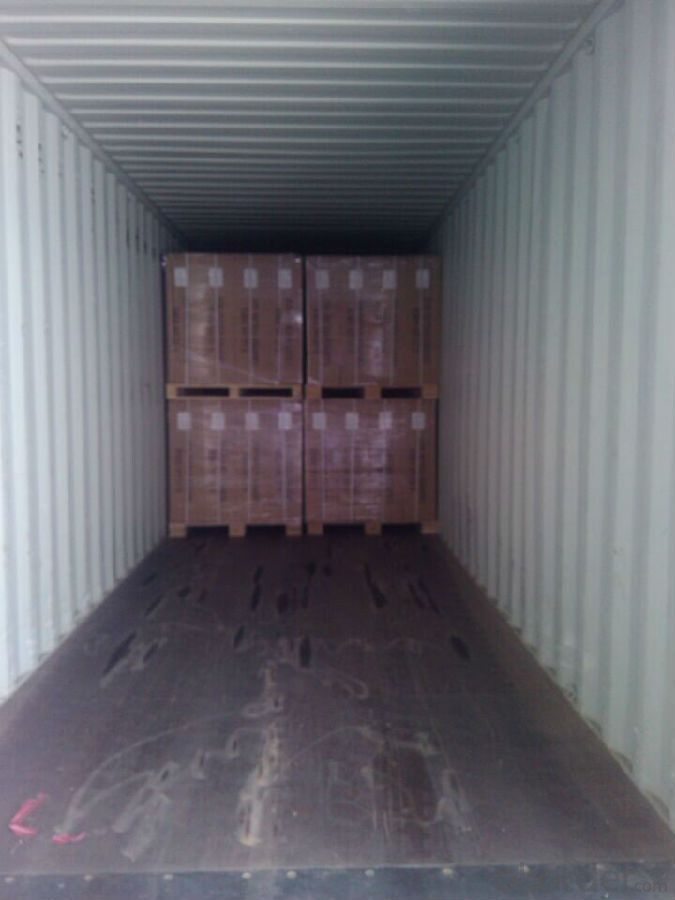
4.FAQ
Packaging:
Each Chopped Strand Mat is wound onto a paper tube which has an inside diameter of 76mm and the mat roll has a diameter of 275mm. The mat roll is wrapped up with plastic film,and then packed in a cardboard box or wrapped up with kraft paper. The rolls can be vertically or horizontally placed. For transportation, the rolls can be loaded into a cantainer directly or on pallets.
Storage:
Unless otherwise specified, Chopped Strand Mat should be stored in a dry, cool and rain-proof area. It is recommended that the room temperature and humidity should be always maintained at 15℃~35℃ and 35%~65% respectively.
- Q: Can fiberglass mat tissue be used for creating molds?
- No, fiberglass mat tissue cannot be used for creating molds. Fiberglass mat tissue is a thin, lightweight material that is typically used as a reinforcement layer in fiberglass composite applications. It is not designed to be a mold-making material. Instead, materials such as silicone, resin, or plaster are commonly used to create molds due to their ability to capture fine details and provide a smooth surface finish.
- Q: Can fiberglass mat tissue be used for acoustic insulation?
- Yes, fiberglass mat tissue can be used for acoustic insulation. It is a commonly used material for soundproofing due to its ability to absorb and dampen sound waves. Its high density and fibrous structure make it effective in reducing noise and improving acoustic performance in buildings, vehicles, and other applications.
- Q: Can fiberglass mat tissue be used for making lightweight panels?
- Yes, fiberglass mat tissue can be used for making lightweight panels. Fiberglass mat tissue is a thin and lightweight material made from fine glass fibers, which are bonded together with a resinous binder. This material is commonly used in the construction industry to reinforce surfaces and provide strength to various applications. When used in panel manufacturing, fiberglass mat tissue can be an excellent choice for producing lightweight panels. The thin and flexible nature of the material allows it to be easily incorporated into panels without adding significant weight. Additionally, fiberglass mat tissue has excellent strength properties, which can contribute to the overall structural integrity of the panels. Furthermore, fiberglass mat tissue can provide insulation and soundproofing properties to the panels, making them suitable for applications where these characteristics are required. The material is also resistant to corrosion and moisture, which enhances the durability and longevity of the panels. Overall, fiberglass mat tissue is a versatile and lightweight material that can be effectively used for making lightweight panels. Its strength, flexibility, insulation properties, and resistance to corrosion and moisture make it a suitable choice for various applications in industries such as construction, automotive, aerospace, and marine.
- Q: Can fiberglass mat tissue be used for insulation in chemical storage tanks?
- Yes, fiberglass mat tissue can be used for insulation in chemical storage tanks. It is a commonly used material due to its excellent thermal insulation properties and resistance to corrosion, making it suitable for protecting the tank and its contents from extreme temperatures and chemical reactions.
- Q: What are the applications of fiberglass mat tissue?
- Fiberglass mat tissue is commonly used in various applications, including but not limited to, the construction industry, automotive manufacturing, and the production of composite materials. It is used as a reinforcement material in the construction of walls, roofs, and floors, providing strength and durability. In the automotive industry, fiberglass mat tissue is used for sound insulation and as a reinforcement material in the production of car parts. Additionally, it is widely utilized in the manufacturing of composite materials, such as fiberglass-reinforced plastics, due to its high strength-to-weight ratio and excellent corrosion resistance.
- Q: Does fiberglass mat tissue provide good moisture control?
- Good moisture control is provided by fiberglass mat tissue, which is widely used in construction and insulation applications due to its excellent resistance to moisture. Made from fine fibers of glass, fiberglass repels moisture effectively, making it a suitable choice for areas where moisture control is crucial, such as walls, roofs, and ceilings. Furthermore, fiberglass mat tissue acts as a vapor barrier, preventing the passage of water vapor and further enhancing its moisture control capabilities. In summary, fiberglass mat tissue is renowned for its reliable ability to provide effective moisture control, making it a dependable option for a range of construction and insulation projects.
- Q: Is fiberglass mat tissue suitable for insulation in food processing facilities?
- No, fiberglass mat tissue is not suitable for insulation in food processing facilities.
- Q: Does fiberglass mat tissue provide any thermal insulation?
- Yes, fiberglass mat tissue does provide thermal insulation. Fiberglass is a poor conductor of heat, which means it does not transfer heat easily. When used as a mat tissue, it helps to trap air within its fibers, creating a layer of insulation. This insulation layer acts as a barrier, preventing heat transfer through conduction and reducing thermal energy loss. Therefore, fiberglass mat tissue can be an effective solution for providing thermal insulation in various applications, such as construction, automotive, and aerospace industries.
- Q: Does fiberglass mat tissue require any special handling or storage requirements?
- Yes, fiberglass mat tissue does require some special handling and storage requirements. Firstly, it is important to handle fiberglass mat tissue with care to avoid any damage or breakage. The tissue should be handled gently and not dragged or dropped, as this can cause the fibers to separate or become damaged. It is also recommended to wear gloves and protective clothing when handling fiberglass mat tissue to prevent any skin irritation or injuries. In terms of storage, fiberglass mat tissue should be kept in a clean and dry environment. It is crucial to protect it from moisture, as exposure to water can weaken the fibers and reduce its effectiveness. Therefore, it is best to store fiberglass mat tissue in a sealed, moisture-proof packaging or in a dry room with controlled humidity levels. Additionally, it is important to keep fiberglass mat tissue away from direct sunlight or extreme temperatures. Exposure to high temperatures can cause the resin in the tissue to cure prematurely, while excessive cold can make it brittle and more prone to damage. Therefore, it is recommended to store fiberglass mat tissue in a cool, shaded area to maintain its quality and ensure its longevity. By following these special handling and storage requirements, fiberglass mat tissue can be protected and preserved in its optimal condition, ready for use in various applications such as construction, insulation, or automotive industries.
- Q: What are the different methods of bonding fiberglass mat tissue to other materials?
- There are various ways to bond fiberglass mat tissue to other materials, each with its own advantages and considerations. Some commonly used methods are as follows: 1. Mechanical Bonding: This technique involves physically interlocking the fiberglass mat tissue with the other material. It can be achieved through stitching, stapling, or using mechanical fasteners like screws or nails. While mechanical bonding provides a strong and durable connection, it may require additional hardware and can be time-consuming. 2. Adhesive Bonding: Adhesive bonding is a popular method that utilizes adhesives or glue to join the fiberglass mat tissue with the other material. This method offers flexibility, as there are different types of adhesives available for various applications. It is important to select an adhesive that is compatible with both the fiberglass mat tissue and the other material. Proper surface preparation and application techniques are crucial for achieving a strong bond. 3. Resin Infusion: Resin infusion involves infusing a liquid resin into the fiberglass mat tissue and other materials, resulting in a strong bond when cured. This method is commonly used in manufacturing composite products, as it allows for a seamless and uniform bond. Vacuum bagging or resin infusion techniques are typically employed to ensure proper resin distribution and consolidation. 4. Thermal Bonding: Thermal bonding employs heat to bond the fiberglass mat tissue to another material. This technique is particularly suitable for thermoplastic materials, as they can be softened and fused together with heat. Heat welding or ultrasonic welding are commonly used techniques for thermal bonding. Care must be taken to prevent damage or degradation of the fiberglass mat tissue during the bonding process. 5. Fusion Bonding: Fusion bonding is a method where the fiberglass mat tissue and the other material are heated to a molten state and then brought into contact to form a bond. This technique is commonly used in the manufacturing of thermosetting plastics or joining thermoplastic materials. Fusion bonding can provide a strong and seamless bond, but it requires precise control of temperature and pressure to ensure proper bonding without causing damage. To summarize, the various methods of bonding fiberglass mat tissue to other materials include mechanical bonding, adhesive bonding, resin infusion, thermal bonding, and fusion bonding. The choice of bonding method depends on factors such as the materials being bonded, the desired strength and durability, and the specific application requirements.
Send your message to us
Fiberglass Mat Tissue E Glass Fiber Chopped Strand Mat for Hand Layup
- Loading Port:
- Shanghai
- Payment Terms:
- TT OR LC
- Min Order Qty:
- 20000 kg
- Supply Capability:
- 200000 kg/month
OKorder Service Pledge
OKorder Financial Service
Similar products
Hot products
Hot Searches
Related keywords
